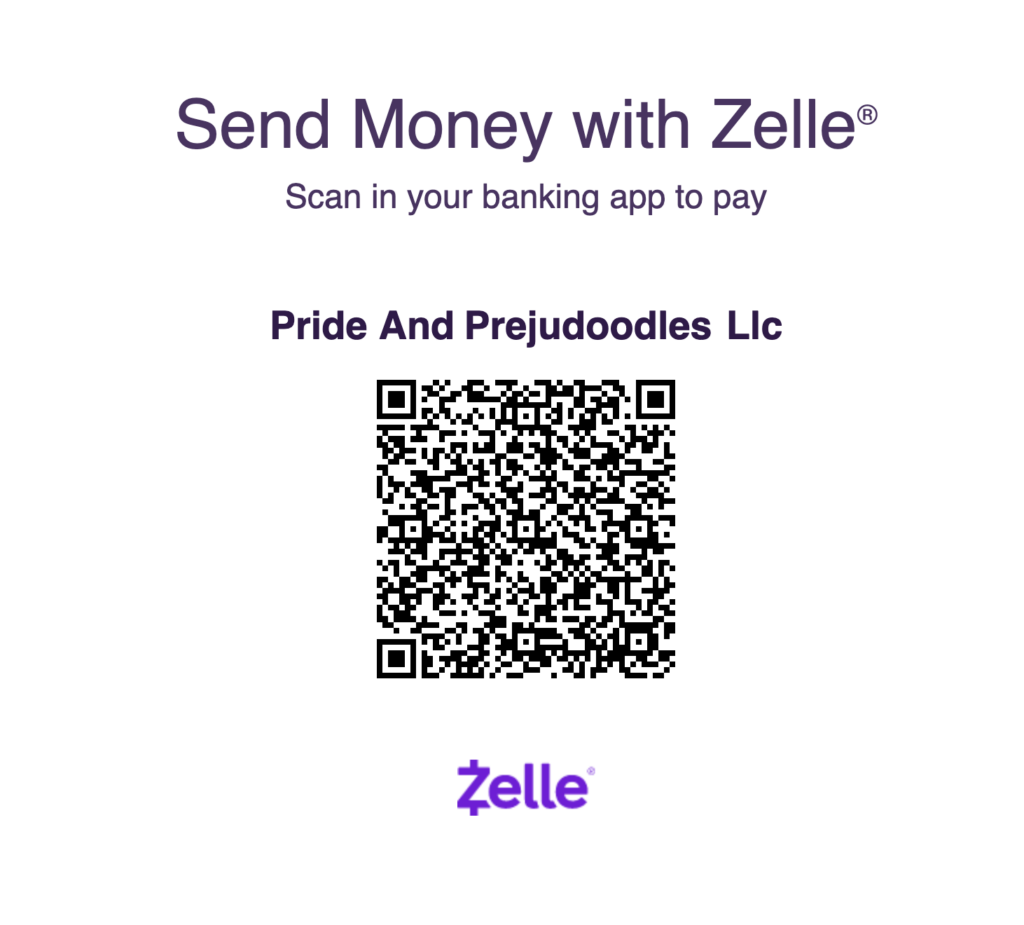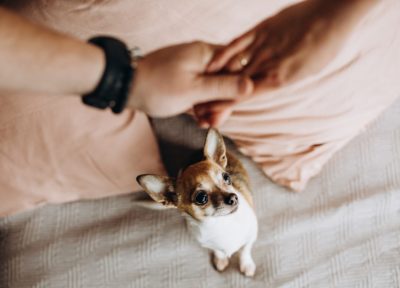 Anecdotally, most dog owners have seen their prized pooch mirror human behavior and show jealousy.
Anecdotally, most dog owners have seen their prized pooch mirror human behavior and show jealousy.
For some, these jealous dog behaviors get out of control and lead to problems for pet parents. Pets feeling jealous isn’t out of the norm. Dogs experience jealousy, just as we do. Read on to find out about eight major signs of a jealous dog and discover how you can use dog training to improve the dog’s experience as part of your family.
Can Dogs Experience Jealousy?
Do dogs get jealous? According to an official study on animal behavior that focused specifically on jealousy in dogs, they do display envy. This jealousy in dogs sample focused on an owner’s attention being captured by another dog, but scientists believe dogs are capable of jealousy in relation to any type of social creature. Like humans, dogs have physical and emotional needs. They get jealous if they feel they are not getting enough attention because of a new family member or a new pup. This can also be made worse if your puppy is untrained!
So, if your adorable doggy appears to be put out whenever your new partner, baby or pup is around, chances are it’s not in your head! There are specific signs to watch out for, and don’t worry, it’s possible to teach everyone to get along just fine. From reinforcing behaviors, to positive reinforcement, to the need for more attention – let’s look at 8 signs of a jealous dog in canines.
8 Signs of a Jealous Dog
1. Doing Tricks Without Commands
Perhaps the most adorable sign that you need to give your dog a helping hand when it comes to jealousy is seeing them perform tricks without prompting. This is a clear sign that they want your attention and for you to be impressed with them. You may just think you’re their favorite person, but in fact this is one of many jealous dog behaviors.
Most behaviorists agree that doggy jealousy is related to territorial instincts. When someone new and beloved enters the home, your dog reads your body language and senses how much you like this new person. The threat of being replaced by this new person or dog triggers primal instincts deep within the dog’s brain and leads to these unwanted behaviors.
It’s important to be gentle and patient with your dog to get the best results.
If you’re struggling to bring dog behavior under control, don’t hesitate to seek help from a trained animal behaviorist or dog trainer. There’s no shame in recognizing when you and your dog could use guidance from professionals. The key is to manage jealousy situations, not ignore them.
2. Aggressive Behavior
Let it be new pets or how you are spending time with a new love interest, in many cases, your pooch will display aggression towards the object of their envy. This aggressive behavior can be shown in a multitude of ways; Whether it’s in the form of biting, barking, nipping or jumping, you need to let them know it’s unacceptable without displaying aggression yourself.
It’s important to understand the pooch has nothing personal against the pet or person; it’s not that they don’t like them. They’re just afraid this visitor may threaten their position in the home.
3. Resource Guarding
Most behaviorists agree that most jealous dog starts with resource guarding in one form or another. Your home is the place they get their food, water, exercise and toys from. If a new person or animal enters the scene, something in their primal brain tells your dog it might take away these much-loved resources.
It’s important to realize the signs and symptoms of Resource Guarding.
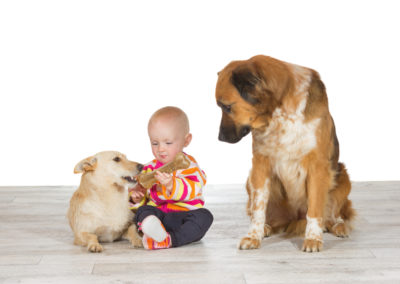
You might see them gather their toys and hide them when the object of envy is around or act strangely around their feeding area. Sometimes, jealous dogs pulled hard on their leash when the owners appeared to stroke other pets or dogs. No matter, a jealous dog will let you know when something is wrong.
4. Destructive Behavior
In addition to showing aggression directly toward whoever is causing them to feel envy, your pooch might take out their worries on your furniture. If a dog that’s normally well-behaved starts scratching or biting at your upholstery or being generally disobedient, jealousy could be the cause.
It’s important to realize Destructive Behavior vs Redirected Excitement.
When an animal feels it’s not getting the attention it needs, it might turn to destruction as a means of gaining attention.
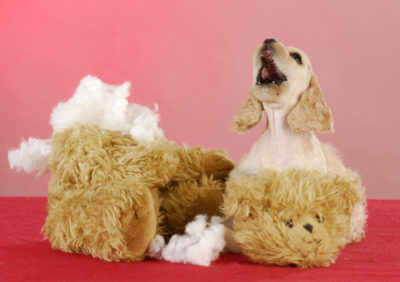
5. The Dog Pushes In
The possessive dog or pushy behavior is an obvious sign of jealousy. If you and your partner are snuggling up to watch a movie or TV series and your dog insists on butting in between you, there’s a clear problem.
It’s important to see whining, gazing longingly at you and taking any chance to clamber onto your lap are pretty sure signs your dog has an envy issue.
6. Inappropriate Toileting
Feeling jealous may cause inappropriate toileting. Peeing or pooping indoors can be frustrating, but this is a clear sign and a form of communication; Your pooch is jealous. Your dog can’t talk or write down what’s causing it stress or unhappiness, so it has to find creative ways to get your attention.
Important: While you shouldn’t rule this out as a sign of a health issue, in many cases it’s a behavioral issue you need to address.
7. Leaving the Room
The most polite way a dog can display jealous behavior is by leaving the room when the object of its envy walks in. Like humans, they legit turn their back to those they don’t want to attend to.
Dogs are highly social animals and withdrawal is a signal to you that there’s a problem, so don’t ignore this one. Don’t follow them from room to room, as this will only reinforce the behavior.
Important: Instead, wait for them to come back and lavish them with treats and attention when they behave well.
8. Over-Grooming
If your dog seems to be cleaning itself all the time, it’s an indication it’s feeling stressed. When it feels it’s missing out on petting and love that you seem to be giving to another person or pet, it uses grooming to self-soothe.
Important: Frustration, boredom and stress can all lead to your doggy over-cleaning itself.
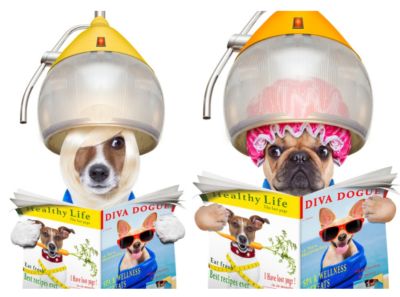
Tips for Overcoming a Dog’s Jealousy
There are many different ways a dog can display jealous dog behavior, so be careful to observe it and ensure that you’ve identified the problem correctly. If it is envy, there are several steps you can take.
Never Reward Envious Behavior
With a dog, just like with a child, any attention is good attention. If your pooch is struggling to get the love it so desperately wants, it’ll be happy to accept a scolding, so long as you’re paying it attention. As such, if you continually react strongly to jealous dog behavior, it’s likely to continue doing it.
Consistently turning away or walking out of the room without looking at it when it displays unwanted behavior is a more effective approach. Focus on the obedience training it learned as a puppy and only offer treats, praise and playtime in response to good behavior.
Get Moving and Training
Sometimes dog owners forget they haven’t trained their prized pooch since puppyhood. If this is the case, it’s time to get the clicker out and get back to basics. Spending this time with your dog is rewarding for both of you, re-strengthens your bond to each other and reaffirms which actions are wanted or unwanted.
Teaching your dog something new and exercising together are the two healthiest types of interaction you can experience together. When new people or pets come into the home, you should be extra-sure to include plenty of time for these activities each week. Stubborn pooches might require additional motivation to get out of the cycle of negative attention. A dog trainer can help you with any specific issues you haven’t been able to fix yourself.
New Partners or Family Members
If a new partner comes into your life or a family member who hasn’t previously been around comes to stay, dogs can feel seriously upstaged. The best way to deal with this is by including the new person in the doggy’s favorite pastimes: eating, walking and playing.
Do not reward pesky behavior with a treat, but let the dog know this person is here to stay. Instead of being tempted to give the new family member lots of treats to bribe the dog, let them provide treats when the dog displays positive behavior. Once the pup has made a positive association with them, they’ll become a regular part of the family.
New Dogs in the Household
A new pooch is pretty scary for your current canine pal because it’s the threat of a like-for-like replacement. The secret in this scenario is to be as fair as possible. Only give out treats when the two dogs are behaving nicely together. This encourages positive association and helps both dogs to polish their obedience skills.
Another excellent idea is always taking them on walks together to bring out the pack mentality in your two pooches. Dogs are highly social, and from an evolutionary perspective, they’ve always run together in packs. You can encourage a strong bond by letting them take on the world together.
Dogs and a New Baby
New babies are particularly troublesome for dogs because your body language tells them you’re seriously invested in this tiny little creature. An excellent starting place would be letting the dog sniff a blanket or outgrown item of clothing that smells of the baby and rewarding them for responding calmly. Additionally, try to keep your dog’s schedule as similar as possible to before baby arrived and encourage lots of positive interaction.
While a jealous dog can be frustrating to deal with, being confident in your position as a pet parent and being intentionally fair will see you through. Make sure you schedule playtime, exercise and petting into your daily routine, even if there’s a new addition to your home. But don’t leave a dog unattended around a baby or a small child. If you need help with training, don’t be shy about going to a dog behaviorist. Pooches are highly intelligent and complex animals, and lots of people need help bringing out the best in their pet.
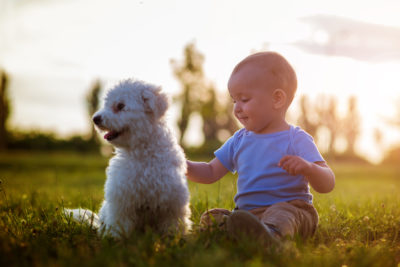
A New Dog Brings So Much to Your Household
The whole family can learn so much from introducing a dog into the home. If you’re ready to tackle the hard work that comes along with having a cute, cuddly pal on hand 24/7, get in touch with Pride and Prejudoodles today through our contact form.
